 W
WThe African Charter on Human and Peoples' Rights is an international human rights instrument that is intended to promote and protect human rights and basic freedoms in the African continent.
 W
WThe Bamako Convention is a treaty of African nations prohibiting the import of any hazardous waste. The Convention was negotiated by twelve nations of the Organisation of African Unity at Bamako, Mali in January, 1991, and came into force in 1998.
 W
WBasel Convention, is an international treaty that was designed to reduce the movements of hazardous waste between nations, and specifically to prevent transfer of hazardous waste from developed to less developed countries (LDCs). It does not, however, address the movement of radioactive waste. The convention is also intended to minimize the rate and toxicity of wastes generated, to ensure their environmentally sound management as closely as possible to the source of generation, and to assist LDCs in environmentally sound management of the hazardous and other wastes they generate.
 W
WThe Convention on Biological Diversity (CBD), known informally as the Biodiversity Convention, is a multilateral treaty. The convention has three main goals: the conservation of biological diversity ; the sustainable use of its components; and the fair and equitable sharing of benefits arising from genetic resources. Its objective is to develop national strategies for the conservation and sustainable use of biological diversity, and it is often seen as the key document regarding sustainable development.
 W
WThe Biological Weapons Convention (BWC), or Biological and Toxin Weapons Convention (BTWC), is a disarmament treaty that effectively bans biological and toxin weapons by prohibiting their development, production, acquisition, transfer, stockpiling and use. The treaty's full name is the Convention on the Prohibition of the Development, Production and Stockpiling of Bacteriological (Biological) and Toxin Weapons and on their Destruction.
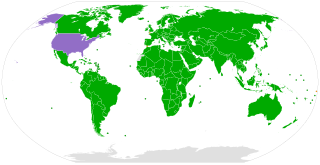 W
WThe United Nations Convention on the Rights of the Child is an international human rights treaty which sets out the civil, political, economic, social, health and cultural rights of children. The Convention defines a child as any human being under the age of eighteen, unless the age of majority is attained earlier under national legislation.
 W
WCITES is a multilateral treaty to protect endangered plants and animals. It was drafted as a result of a resolution adopted in 1963 at a meeting of members of the International Union for Conservation of Nature (IUCN). The convention was opened for signature in 1973 and CITES entered into force on 1 July 1975.
 W
WThe International Covenant on Civil and Political Rights (ICCPR) is a multilateral treaty adopted by United Nations General Assembly Resolution 2200A (XXI) on 16 December 1966, and in force from 23 March 1976 in accordance with Article 49 of the covenant. Article 49 allowed that the covenant would enter into force three months after the date of the deposit of the thirty-fifth instrument of ratification or accession. The covenant commits its parties to respect the civil and political rights of individuals, including the right to life, freedom of religion, freedom of speech, freedom of assembly, electoral rights and rights to due process and a fair trial. As of September 2019, the Covenant has 173 parties and six more signatories without ratification. Notable holdouts are People's Republic of China and Cuba. North Korea tried to withdraw.
 W
WThe First Optional Protocol to the International Covenant on Civil and Political Rights is an international treaty establishing an individual complaint mechanism for the International Covenant on Civil and Political Rights (ICCPR). It was adopted by the UN General Assembly on 16 December 1966, and entered into force on 23 March 1976. As of May 2020, it had 35 signatories and 116 states parties. Two of the ratifying states—Jamaica and Trinidad and Tobago—have denounced the protocol.
 W
WThe Committee Against Torture (CAT) is a body of human rights experts that monitors implementation of the United Nations Convention against Torture by state parties. The Committee is one of eight UN-linked human rights treaty bodies. All state parties are obliged under the Convention to submit regular reports to the CAT on how rights are being implemented. Upon ratifying the Convention, states must submit a report within one year, after which they are obliged to report every four years. The Committee examines each report and addresses its concerns and recommendations to the state party in the form of "concluding observations." Under certain circumstances, the CAT may consider complaints or communications from individuals claiming that their rights under the Convention have been violated.
 W
WThe Common Fund for Commodities (CFC) is an intergovernmental financial institution established within the framework of the United Nations. It is a vestige of the proposed New International Economic Order. The CFC finances commodity development projects in developing states.
 W
WThe Convention on the Conservation of Migratory Species of Wild Animals, also known as the Convention on Migratory Species (CMS) or the Bonn Convention, is an international agreement that aims to conserve migratory species throughout their ranges. The Agreement was signed under the auspices of the United Nations Environment Programme and is concerned with conservation of wildlife and habitats on a global scale.
 W
WThe World Customs Organization (WCO) is an intergovernmental organization headquartered in Brussels, Belgium. The WCO works on customs-related matters including the development of international conventions, instruments, and tools on topics such as commodity classification, valuation, rules of origin, collection of customs revenue, supply chain security, international trade facilitation, customs enforcement activities, combating counterfeiting in support of Intellectual Property Rights (IPR), illegal drug enforcement, combating counterfeiting of medicinal drugs, illegal weapons trading, integrity promotion, and delivering sustainable capacity building to assist with customs reforms and modernization. The WCO maintains the international Harmonized System (HS) goods nomenclature, and administers the technical aspects of the World Trade Organization (WTO) Agreements on Customs Valuation and Rules of Origin.
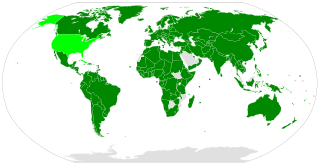 W
WThe International Covenant on Economic, Social and Cultural Rights (ICESCR) is a multilateral treaty adopted by the United Nations General Assembly on 16 December 1966 through GA. Resolution 2200A (XXI), and came in force from 3 January 1976. It commits its parties to work toward the granting of economic, social, and cultural rights (ESCR) to the Non-Self-Governing and Trust Territories and individuals, including labour rights and the right to health, the right to education, and the right to an adequate standard of living. As of July 2020, the Covenant has 171 parties. A further four countries, including the United States, have signed but not ratified the Covenant.
 W
WThe Convention for the Protection of Producers of Phonograms Against Unauthorized Duplication of Their Phonograms, also known as the Geneva Phonograms Convention, is a 1971 international agreement relating to copyright protection for sound recordings.
 W
WThe Organisation of African, Caribbean and Pacific States (OACPS) is a group of countries in Africa, the Caribbean, and the Pacific that was created by the Georgetown Agreement in 1975. Formerly known as African, Caribbean and Pacific Group of States (ACP), the organisation's main objectives are sustainable development and poverty reduction within its member states, as well as their greater integration into the world's economy. All of the member states, except Cuba, are signatories to the Cotonou Agreement with the European Union.
 W
WThe International Fund for Agricultural Development is an international financial institution and a specialised agency of the United Nations that works to address poverty and hunger in rural areas of developing countries. It is the only multilateral development organization that focuses solely on rural economies and food security.
 W
WThe International Hydrographic Organization (IHO) is an intergovernmental organization representing hydrography. In January 2021 the IHO comprised 94 Member States.
 W
WThe International Maritime Organization is a specialised agency of the United Nations responsible for regulating shipping. The IMO was established following agreement at a UN conference held in Geneva in 1948 and the IMO came into existence ten years later, meeting for the first time in 1959. Headquartered in London, United Kingdom, the IMO currently has 174 member states and three associate members.
 W
WThe International Telecommunications Satellite Organization (ITSO) is an intergovernmental organization charged with overseeing the public service obligations of Intelsat.
 W
WThe United Nations Convention on the Law of the Sea (UNCLOS), also called the Law of the Sea Convention or the Law of the Sea Treaty, is an international agreement that establishes a legal framework for all marine and maritime activities. As of June 2016, 167 countries and the European Union are parties.
 W
WThe Convention on the Prevention of Marine Pollution by Dumping of Wastes and Other Matter 1972, commonly called the "London Convention" or "LC '72" and also abbreviated as Marine Dumping, is an agreement to control pollution of the sea by dumping and to encourage regional agreements supplementary to the Convention. It covers the deliberate disposal at sea of wastes or other matter from vessels, aircraft, and platforms. It does not cover discharges from land-based sources such as pipes and outfalls, wastes generated incidental to normal operation of vessels, or placement of materials for purposes other than mere disposal, providing such disposal is not contrary to aims of the Convention. It entered into force in 1975. As of September 2016, there were 89 Parties to the Convention.
 W
WThe Montreal Protocol on Substances that Deplete the Ozone Layer, also known simply as the Montreal Protocol, is an international treaty designed to protect the ozone layer by phasing out the production of numerous substances that are responsible for ozone depletion. Open for signature on 16 September 1987, it was made pursuant to the 1985 Vienna Convention for the Protection of the Ozone Layer, which established the framework for international cooperation in addressing ozone depletion. The Montreal Protocol entered into force on 1 January 1989, and has since undergone nine revisions, in 1990 (London), 1991 (Nairobi), 1992 (Copenhagen), 1993 (Bangkok), 1995 (Vienna), 1997 (Montreal), 1998 (Australia), 1999 (Beijing) and 2016 (Kigali).
 W
WA World Heritage Site is a landmark or area with legal protection by an international convention administered by the United Nations Educational, Scientific and Cultural Organization (UNESCO). World Heritage Sites are designated by UNESCO for having cultural, historical, scientific or other form of significance. The sites are judged to contain "cultural and natural heritage around the world considered to be of outstanding value to humanity". To be selected, a World Heritage Site must be a somehow unique landmark which is geographically and historically identifiable and has special cultural or physical significance. For example, World Heritage Sites might be ancient ruins or historical structures, buildings, cities, deserts, forests, islands, lakes, monuments, mountains, or wilderness areas. A World Heritage Site may signify a remarkable accomplishment of humanity, and serve as evidence of our intellectual history on the planet, or it might be a place of great natural beauty. As of July 2021, a total of 1,154 World Heritage Sites exist across 167 countries. With 58 selected areas, Italy is the country with the most sites on the list.
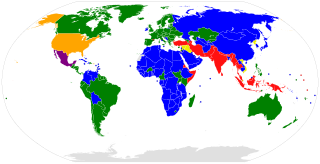 W
WProtocol I is a 1977 amendment protocol to the Geneva Conventions relating to the protection of victims of international conflicts, where "armed conflicts in which peoples are fighting against colonial domination, alien occupation or racist regimes" are to be considered international conflicts. It reaffirms the international laws of the original Geneva Conventions of 1949, but adds clarifications and new provisions to accommodate developments in modern international warfare that have taken place since the Second World War.
 W
WThe Convention on Psychotropic Substances of 1971 is a United Nations treaty designed to control psychoactive drugs such as amphetamine-type stimulants, barbiturates, benzodiazepines, and psychedelics signed in Vienna, Austria on 21 February 1971. The Single Convention on Narcotic Drugs of 1961 did not ban the many newly discovered psychotropics, since its scope was limited to drugs with cannabis, coca, and opium-like effects.
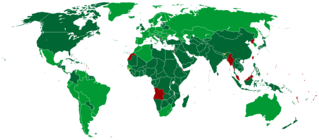 W
WThe International Convention on the Elimination of All Forms of Racial Discrimination (ICERD) is a United Nations convention. A third-generation human rights instrument, the Convention commits its members to the elimination of racial discrimination and the promotion of understanding among all races. The Convention also requires its parties to outlaw hate speech and criminalize membership in racist organizations.
 W
WThe Ramsar Convention on Wetlands of International Importance Especially as Waterfowl Habitat is an international treaty for the conservation and sustainable use of wetlands. It is also known as the Convention on Wetlands. It is named after the city of Ramsar in Iran, where the convention was signed in 1971.
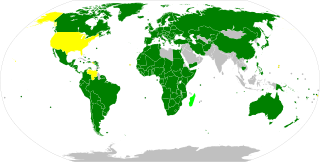 W
WThe Protocol Relating to the Status of Refugees is a key treaty in international refugee law. It entered into force on 4 October 1967, and 146 countries are parties.
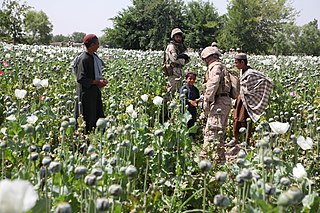 W
WThe Single Convention on Narcotic Drugs of 1961 is an international treaty that prohibits production and supply of specific narcotic drugs and licenses other drugs with similar effects for medical treatment and research. The treaty updated the Paris Convention of 13 July 1931, to include the vast number of synthetic opioids invented in the intervening thirty years and to add a mechanism for more easily including new ones. From 1931 to 1961, most of the families of synthetic opioids had been developed, including drugs related to methadone, pethidine (meperidine/Demerol), morphinans and dextromoramide. Research on fentanyls and piritramide was also nearing fruition at that point.
 W
WThe Convention against Torture and Other Cruel, Inhuman or Degrading Treatment or Punishment is an international human rights treaty, under the review of the United Nations, that aims to prevent torture and other acts of cruel, inhuman, or degrading treatment or punishment around the world.
 W
WThe UNESCO 1970 Convention on the Means of Prohibiting and Preventing the Illicit Import, Export and Transfer of Ownership of Cultural Property is an international treaty. The treaty, signed to combat the illegal trade in cultural items, was signed on 14 November 1970, and came into effect on 24 April 1972. As of August 2021, 141 states have ratified the treaty.
 W
WThe United Nations Industrial Development Organization (UNIDO) is a specialized agency of the United Nations that assists countries in economic and industrial development. It is headquartered at the UN Office in Vienna, Austria, with a permanent presence in over 60 countries. As of April 2019, UNIDO comprises 170 member states, which together set the organization's policies, programs, and principles through the biannual General Conference.
 W
WThe Vienna Convention on Consular Relations is an international treaty that defines a framework for consular relations between sovereign states. It codifies many consular practices that originated from state custom and various bilateral agreements between states.
 W
WThe Convention on Road Signs and Signals, commonly known as the Vienna Convention on Road Signs and Signals, is a multilateral treaty designed to increase road safety and aid international road traffic by standardising the signing system for road traffic in use internationally.
 W
WThe Convention on Road Traffic, commonly known as the Vienna Convention on Road Traffic, is an international treaty designed to facilitate international road traffic and to increase road safety by establishing standard traffic rules among the contracting parties. The convention was agreed upon at the United Nations Economic and Social Council's Conference on Road Traffic and concluded in Vienna on 8 November 1968. It came into force on 21 May 1977. This conference also produced the Convention on Road Signs and Signals. The Convention had amendments on 3 September 1993 and 28 March 2006. There is a European Agreement supplementing the Convention on Road Traffic (1968), which was concluded in Geneva, on 1 May 1971.
 W
WThe Vienna Convention on the Law of Treaties (VCLT) is an international agreement regulating treaties between states. Known as the "treaty on treaties", it establishes comprehensive rules, procedures, and guidelines for how treaties are defined, drafted, amended, interpreted, and generally operated. An international treaty is a written agreement between international law subjects reflecting their consent to the creation, alteration, or termination of their rights and obligations. The VCLT is considered a codification of customary international law and state practice concerning treaties.
 W
WThe Convention on the Elimination of all Forms of Discrimination Against Women (CEDAW) is an international treaty adopted in 1979 by the United Nations General Assembly. Described as an international bill of rights for women, it was instituted on 3 September 1981 and has been ratified by 189 states. Over fifty countries that have ratified the Convention have done so subject to certain declarations, reservations, and objections, including 38 countries who rejected the enforcement article 29, which addresses means of settlement for disputes concerning the interpretation or application of the Convention. Australia's declaration noted the limitations on central government power resulting from its federal constitutional system. The United States and Palau have signed, but not ratified the treaty. The Holy See, Iran, Somalia, and Tonga are not signatories to CEDAW.
 W
WThe World Tourism Organization (UNWTO) is the United Nations specialized agency entrusted with the promotion of responsible, sustainable and universally accessible tourism, having its headquarters in Madrid, Spain. It is the leading international organization in the field of tourism, which promotes tourism as a driver of economic growth, inclusive development and environmental sustainability and offers the sector leadership and support in advancing knowledge and tourism policies worldwide. It serves as a global forum for tourism policy issues and a practical source of tourism research and knowledge. It encourages the implementation of the Global Code of Ethics for Tourism to maximize the contribution of tourism to socio-economic development, while minimizing its possible negative impacts, and is committed to promoting tourism as an instrument in achieving the United Nations Sustainable Development Goals (SDGs), geared towards eliminating poverty and fostering sustainable development and peace worldwide.